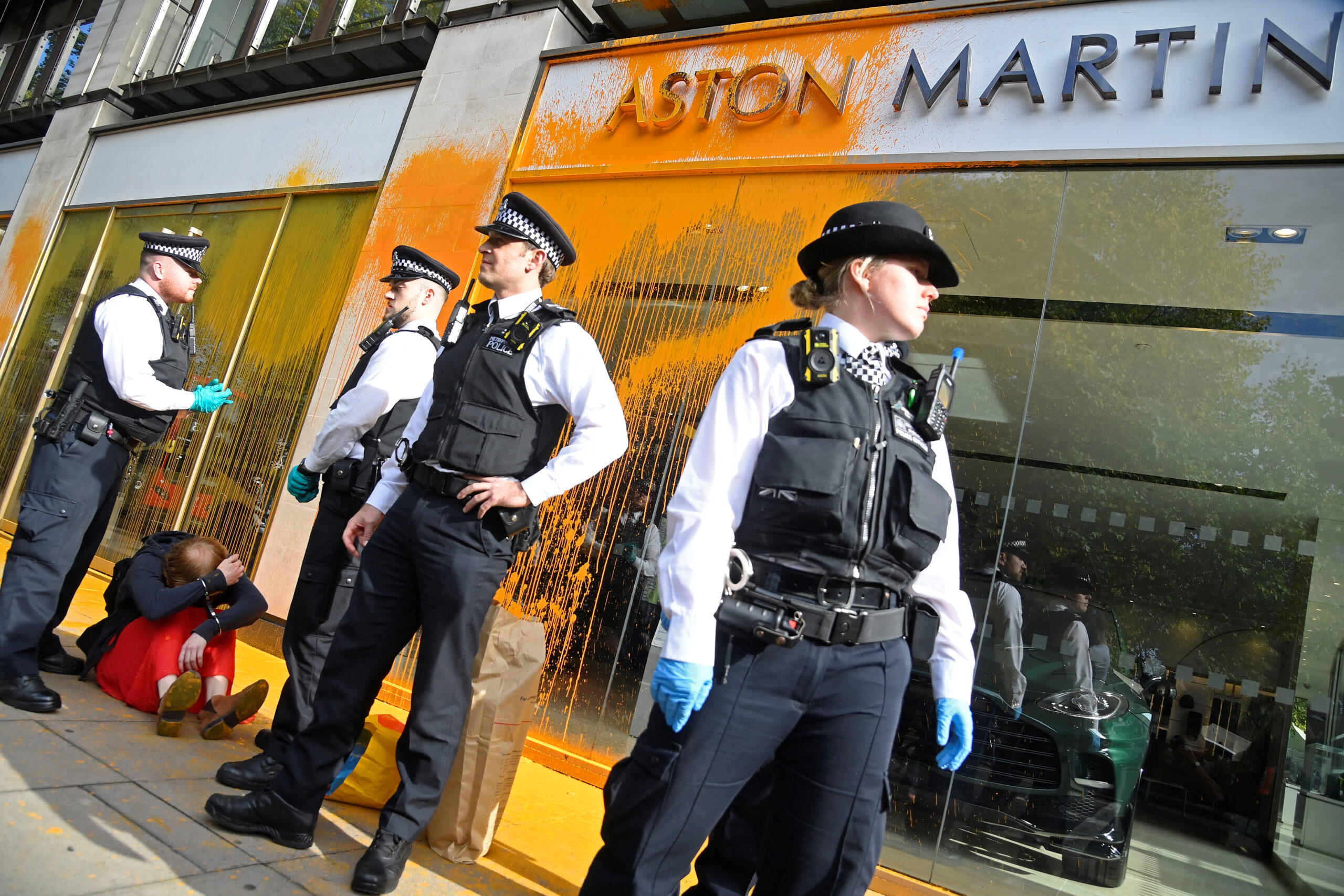Climate Activists Are Back. But Where’s The Movement?

It’s been quite a month for climate protests. Over the last four weeks, activists have pulled off the seemingly impossible and organised a different protest every single day. They’ve blocked traffic, stopped oil tankers, painted the Home Office orange, smeared chocolate cake over a waxwork of King Charles, and thrown a can of tomato soup at a Van Gogh painting. It’s been an extraordinary, freewheeling carnival of action, and long may it continue.
The group behind these protests, Just Stop Oil, is calling for a moratorium on all future oil and gas licences. It believes causing maximum disruption to the state will eventually lead to a meaningful change in policy. “It’s truly amazing what a small group of people can do,” said one of its organisers. “A few people can make an enormous amount of difference.”
So far, however, all Just Stop Oil has received by way of government response has been insults. The home secretary has bemoaned the “Guardian-reading tofu-eating wokerati”, and threatened to invent new laws to lock up protesters. Disappointed, last week the group momentarily paused its protests, vowing to “escalate legal disruption against this treasonous government” imminently.
Perhaps, however, it’s worth taking a moment to catch our breath. Three years ago, the climate movement was mobilising millions of people. In Britain, thousands of Extinction Rebellion protesters were arrested in one of the biggest civil disobedience events in history, while hundreds of thousands of school students took to the streets. Both movements paved the way for real legislative change: the government adopted a legally-binding net zero target, and Labour backed a socialist Green New Deal. And crucially, they gave the establishment a fright. “Extinction Rebellion protesters caught us out”, former top cop Cressida Dick admitted. “We will have to be very fast and assertive next time round.”
A lot has changed since then. The left lost its parliamentary vehicle in the 2019 election, and Covid-19 followed. The government also passed legislation to further criminalise peaceful protest, and the police illegally banned Extinction Rebellion protests. The climate movement fractured, unable to adapt to a new political landscape. It seemed, for a moment, like it could be condemned to years of decline.
It wasn’t all bad, however. With an enforced break to learn and refocus – and with the rise of other movements such as Black Lives Matter – many white environmentalists were prompted to finally rethink their problematic attitudes towards the police. Gone was the “love-bombing” of police stations and the most egregious examples of a movement that claimed to be “beyond politics”. In Glasgow last November, over a hundred thousand people marched for climate justice.
But this progress did not result in the rebirth of a mass movement. The groups following Extinction Rebellion – Insulate Britain and Just Stop Oil, to name two – have struggled to mobilise more than a few hundred people to take part in their actions. Just Stop Oil’s recent roadblocks have mobilised around 10 to 15 people per protest, while other stunts have often been carried out by just two or three. While they’ve certainly succeeded in dominating the news cycle, this is hardly the scale of action needed to bring the government to the negotiating table – and has often led to angry confrontations with the general public.
This wouldn’t necessarily be a problem if these actions were part of a wider movement. In recent years, strategic conversations have been dominated by discussion of what should happen on the ‘radical flank’ of the climate movement – due in part to debates reinvigorated by the publication of How to Blow Up a Pipeline by Andreas Malm. The radical flank effect is the idea that by taking more radical action, a particular faction within a wider movement can increase support for more moderate factions – and that being ‘liked’ by the public isn’t what’s important.
But the problem is that right now, the radical flank of the climate movement isn’t functioning as such. This is because there’s not much of a movement to flank. While we certainly need targeted direct action, we also need much more than that. We need different groups to do different things, and – crucially – we need an effective vehicle for mass mobilisation. This isn’t a one or the other situation. We need everything, everywhere, all at once.
While Extinction Rebellion and the youth strikes can no longer call people to action in the way they once did, it would be naive to reject the possibility that they might flare up again, bigger and better than ever. But, for the moment, the momentum is no longer there, and there’s room for a new mass movement. This movement needs to have a systemic analysis of the climate crisis, and it needs to innovate in its tactics. And the left should engage with it this time, rather than criticising from the sidelines.
If the radical flank of the movement is going to escalate its tactics – and I hope it does – then we need another vehicle with a lower barrier to entry, capable of mobilising hundreds of thousands of people. The task at hand is building that movement. Just Stop Oil is playing its part. The rest of us need to get on the streets.
Sam Knights is a climate justice activist and the editor of This Is Not A Drill: An Extinction Rebellion Handbook.


